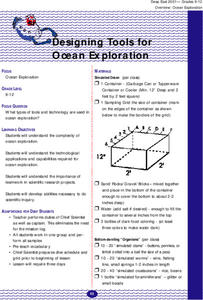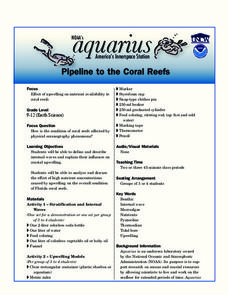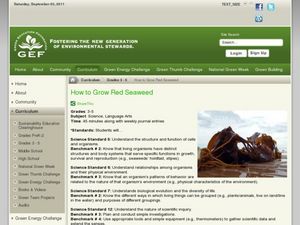Shelby County Schools
How Ecosystems Work
How does one organism get its energy? What is the main source of energy in an ecosystem? How does the flow of energy affect different types of ecosystems? Answer these questions with a fill-in-the-blank worksheet.
NOAA
Where Have All the Glaciers Gone?
What happens when ice melts? Well ... water happens. When that melting ice is a glacier, the amount of water that results produces change throughout the world. Middle school science sleuths uncover the truth about global warming, the...
Wilderness Classroom
Pollution
Educate scholars on pollution—air, water, and land—with a series of lessons that begin with a thorough explanation of each type. Learners then take part in three activities to reinforce the importance of reducing pollution. They...
Curated OER
Feeding in the Flow
The National Oceanic and Atmospheric Administration (NOAA) has developed a tremendous library of ocean-themed lessons that can be used in a variety of science settings. "Feeding in the Flow" is one of those activities; Its focus is on...
Curated OER
Water Quality Monitoring
Students comprehend the four parameters of water quality. They perform tests for salinity, dissolved oxygen, pH and clarity or turbidity. Students comprehend why scientists and environmental managers monitor water uality and aquatic...
Curated OER
Designing Tools for Ocean Exploration
Pupils research the methods and tools used in ocean exploration. They, in groups, simulate an ocean exploration and consider what tools facilitate the exploration's objectives.
Curated OER
Water Pressure - Observing Water Flow
Students discover that pressure increases the deeper the ocean becomes. They determine how water pressure differs at various depths by observing water flow.
Curated OER
My Water's Place in Space
Students discover their absolute and relative place in space relative to water and create a book sequencing that space from most specific to most general.
NOAA
Sustaining Our Ocean Resources
Lead young scientists on an investigation of fishery practices with the final installment of this four-part unit. Using a PowerPoint presentation and hands-on simulation, this activity engages children in learning how fish populations...
Florida International University
Pipeline to the Coral Reefs
Discover firsthand the effects of internal waves on coral reefs. Through a series of experiments, learners simulate internal waves and upwelling events as they make observations on the movement of water and other debris. They then...
NOAA
Microfriends
Is there medicine found in the organisms that live deep below the surface of the ocean? The fifth lesson in a six-part series has learners team up to research bacteria and the relationship it has with nearly every living thing on Earth....
NOAA
Seamounts
How do chains of islands form? Young oceanographers explore the mountains of the deep in the final installment in a 13-part series. The interactive compares types of seamounts based on their overall height and height under the water, as...
National Wildlife Federation
Penguin Fun Facts
What's black and white and can dive up to 1,800 feet under water? That's right, penguins! Learn this and many other amazing facts about these unique birds with this handy reference sheet.
Curated OER
How To Grow Red Seaweed
Students explore ocean biology by participating in a plant growing activity. For this seaweed lesson, students identify the importance and uses of seaweed in the ocean and examine different seaweed samples. Students utilize an aquarium,...
Curated OER
Turning the Tide on Trash: Marine Debris Curriculum
Seven pages of fascinating reading on marine debris preface the activities in this lesson plan. Four different activities are employed to simulate how the debris is distributed in the ocean and along beaches. Early ecology learners...
Curated OER
The Chesapeake Bay in Captain John Smith's Time
When Captain John Smith visited the Chesapeake Bay in the summer of 1608, what types of animals and habitats did he encounter? Your young historians will analyze primary source documents to answer this question, as well as compare the...
Curated OER
Ocean Vocabulary
In this vocabulary worksheet, students match words related to the ocean to their definitions. Worksheet is labeled as a quiz, but may be used as review/practice.
Curated OER
Water in the Environment
For this water in the environment worksheet, students match 10 terms related to water to their definitions. They identify 10 sentences as true or false related to groundwater, layering and landfills. They fill in the blanks for 2...
Curated OER
Water Pollution
Students explore the causes of water pollution. In this environmental lesson, students conduct experiments with natural filtration systems.
Curated OER
The Water Cycle
When homeschooling parents and children tackle the water cycle, the results can be a fascinating exploration of our environment.
Curated OER
Down in the Dumps
After an introduction to municipal sludge, middle school ecologists consider the pros and cons of dumping in the Hudson River Canyon. The class is split into two groups: one to debate in favor or dumping and one to debate against the...
Curated OER
How to Hide in the Ocean
Students observe and discuss the advantages of camouflage, then try their hands at designing a well-camouflaged fish.
University of California
Plankton
Plankton: so much more than just a SpongeBob character. Three different activities have kids looking at both phytoplankton and zooplankton in pictures, as well as collecting their own samples (depending on your access to a saltwater...
Curated OER
Immersion Presents Monterey Bay
Students study Monterey Bay. In this Monterey Bay lesson, students create a model of upwelling around Monterey Bay. Students simulate surface water movement relative to prevailing winds.

























